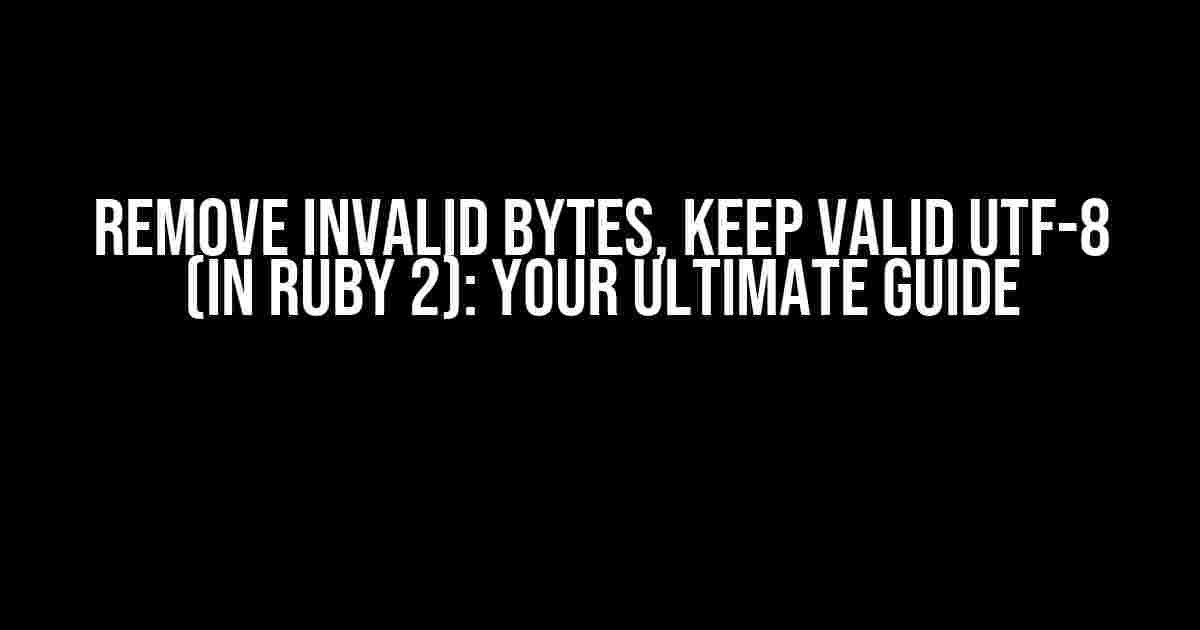Are you tired of dealing with invalid bytes that wreak havoc on your beautifully crafted Ruby code? Well, say goodbye to those pesky errors and hello to smooth, error-free coding with this comprehensive guide on removing invalid bytes and keeping valid UTF-8 in Ruby 2!
What are Invalid Bytes, and Why Do They Matter?
When working with UTF-8 encoded strings, it’s not uncommon to encounter invalid bytes that can cause errors, crashes, and frustration. But what exactly are invalid bytes, and why do they matter?
Invalid bytes refer to bytes that don’t conform to the UTF-8 encoding standard. This can occur when data is corrupted, truncated, or incorrectly encoded. These rogue bytes can lead to a range of issues, including:
- Errors and exceptions
- Data loss or corruption
- Security vulnerabilities
- Performance degradation
In Ruby 2, it’s essential to remove invalid bytes to ensure the integrity and reliability of your code. But before we dive into the solutions, let’s explore the different types of invalid bytes.
Types of Invalid Bytes
There are several types of invalid bytes, including:
| Type | Description |
|---|---|
| Overlong encodings | Bytes that exceed the maximum allowed length for a UTF-8 sequence |
| Invalid start bytes | Bytes that don’t match the expected start byte of a UTF-8 sequence |
| Mismatched continuation bytes | Bytes that don’t match the expected continuation byte of a UTF-8 sequence |
| Unpaired surrogates | Bytes that represent half of a surrogate pair, but lack the corresponding pair |
Removing Invalid Bytes in Ruby 2
Now that we’ve covered the what and why of invalid bytes, let’s get to the good stuff – removing them! Ruby 2 provides several methods to tackle this task. We’ll explore each one in detail.
Method 1: Using `String#encode` with `invalid: :replace`
One of the most straightforward ways to remove invalid bytes is by using the `String#encode` method with the `invalid: :replace` option. This method replaces invalid bytes with a replacement character (usually the Unicode replacement character, U+FFFD).
original_string = "Hello, \uFFFDworld!" # contains an invalid byte
fixed_string = original_string.encode("UTF-8", invalid: :replace, undef: :replace)
p fixed_string # => "Hello, �world!"
Note that this method replaces invalid bytes with a replacement character, which may not be suitable for all use cases.
Method 2: Using `String#scrub`
Introduced in Ruby 2.1, `String#scrub` is a more elegant solution for removing invalid bytes. This method returns a new string with invalid bytes replaced with a replacement character (again, usually U+FFFD).
original_string = "Hello, \uFFFDworld!" # contains an invalid byte
fixed_string = original_string.scrub
p fixed_string # => "Hello, �world!"
You can also specify a replacement character using the `replacement` option.
original_string = "Hello, \uFFFDworld!" # contains an invalid byte
fixed_string = original_string.scrub(replacement: "?")
p fixed_string # => "Hello, ?world!"
Method 3: Using `String#gsub` with a UTF-8 Regexp
Another approach involves using `String#gsub` with a regular expression that matches invalid UTF-8 bytes.
original_string = "Hello, \uFFFDworld!" # contains an invalid byte
utf8_regex = /[^\x{0000}-\x{007F}|\x{0080}-\x{D7FF}|\x{E000}-\x{FFFD}]/n
fixed_string = original_string.gsub(utf8_regex, "")
p fixed_string # => "Hello, world!"
This method requires a good understanding of UTF-8 encoding and regular expressions.
Performance Considerations
When working with large datasets or performance-critical applications, it’s essential to consider the performance implications of removing invalid bytes.
The `String#encode` method with `invalid: :replace` is generally the fastest option, followed by `String#scrub`. The `String#gsub` approach can be slower due to the overhead of regular expression matching.
However, the performance difference may be negligible in most cases, and the choice of method ultimately depends on your specific requirements and constraints.
Conclusion
There you have it – a comprehensive guide on removing invalid bytes and keeping valid UTF-8 in Ruby 2! By understanding the types of invalid bytes and using the methods outlined above, you can ensure the integrity and reliability of your Ruby code.
Remember, when dealing with invalid bytes, it’s essential to be proactive and address the issue promptly to avoid errors, data loss, and security vulnerabilities.
So, go forth and code with confidence, knowing that your UTF-8 encoded strings are safe from the menace of invalid bytes!
Frequently Asked Question
Ruby developers, have you ever encountered invalid bytes in your UTF-8 encoded strings? Well, worry no more! Here are the answers to your most pressing questions about removing those pesky bytes and keeping only the valid ones.
How can I remove invalid bytes from a UTF-8 encoded string in Ruby?
You can use the `encode` method with the `invalid: :replace` option. For example: `” INVALID STRING “.encode(“UTF-16”, invalid: :replace, undef: :replace).encode(“UTF-8”)`. This will replace invalid bytes with a replacement character.
What if I want to remove invalid bytes entirely, without replacing them with a character?
No problem! You can use the `encode` method with the `invalid: :drop` option. For example: `” INVALID STRING “.encode(“UTF-16”, invalid: :drop, undef: :drop).encode(“UTF-8”)`. This will simply drop any invalid bytes.
How can I check if a string contains invalid bytes in Ruby?
You can use the `valid_encoding?` method, which returns `true` if the string has a valid encoding and `false` otherwise. For example: `”INVALID STRING”.encoding.name == “UTF-8” && “INVALID STRING”.valid_encoding?`. This will check if the string is encoded in UTF-8 and if it’s valid.
Can I use a regular expression to remove invalid bytes from a string?
While it’s technically possible to use a regular expression to remove invalid bytes, it’s not the most elegant or efficient solution. The `encode` method is specifically designed for this purpose, and it’s much faster and more reliable. Stick with the `encode` method for this task!
Are there any gems or libraries that can help me with removing invalid bytes from UTF-8 encoded strings?
While the built-in `encode` method is usually sufficient, there are some gems like `utf8-cleaner` and `string-utility` that provide additional functionality for cleaning and normalizing UTF-8 encoded strings. You can explore these gems if you need more advanced features, but for simple cases, the built-in `encode` method is all you need!

